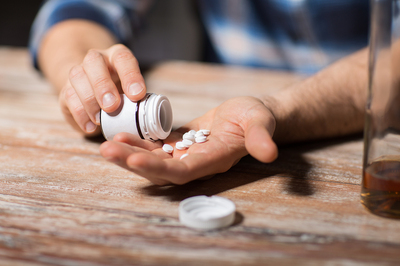
Because alcohol use is so prevalent, many people are unaware of the dangers of mixing it with codeine and other prescription drugs.
Many doctors prescribe codeine for patients suffering from moderate pain. Unfortunately, many people are unaware that mixing codeine with alcohol can have dangerous, and even deadly, outcomes. Read on for a closer look at the consequences of mixing codeine and alcohol, along with information on codeine addiction and codeine addiction treatment.
About Codeine and Alcohol
Codeine phosphate, AKA codeine, is an opioid used as both a painkiller and cough suppressant. While it is a comparatively “mild” narcotic, it is still both addictive and dangerous. Often used to treat mild pain, it has grown in use as a recreational drug. It is especially popular with high school students and young adults.
While codeine should only be used under the direction of a doctor, the dangers of abusing it are amplified when alcohol is introduced to the equation. Because of this, the two should not be used together. However, because alcohol is so commonplace and part of many people’s daily routines, many users don’t realize that mixing it with codeine is particularly perilous.
Four Reasons Not to Mix Codeine and Alcohol
Looking for specific reasons not to use codeine and alcohol? There are many, including the following:
1. They’re both depressants.
Codeine and alcohol are both depressant drugs. This means they both have a sedative effect when taken. It follows that when users combine two depressants, the effects are increased.
2. Together, they cause many side effects.
While codeine and alcohol both lead to side effects on their own, these can be exacerbated when the two drugs are used together since they both impact the nervous system. Side effects of mixing these two depressants include dizziness, drowsiness, feelings of lightheadedness, trouble concentrating, fainting, impaired thinking and judgment, delayed motor skills and reaction time, respiratory distress, and low blood pressure.
3. They can increase the risk of accidents.
The combined sedative effect of codeine and alcohol can lead to other repercussions, such as falls, car accidents, and other mishaps. They can result in everything from broken bones to head injuries.

In addition to direct side effects, mixing codeine and alcohol can lead to other dangerous consequences, such as car accidents.
4. Using both increases the risk of overdose.
Not only does using codeine and alcohol produce a stronger reaction, but it can also lead to respiratory depression, which reduces the amount of oxygen circulating throughout the body. That puts the user at risk for long-term health damage, such as kidney disease, liver damage, brain damage, coma, and even death. As addicts can also develop a tolerance to both codeine and alcohol, this necessitates taking larger amounts of both in order to get the same effect — a potentially lethal cycle.
According to research published in the CDC’s Centers for Disease Control and Prevention, alcohol involvement in opioid pain reliever and benzo drug-related emergency department visits and drug-related deaths is significant.
In fact, concludes the report, “The fact that approximately one fifth of OPR drug abuse-related ED visits and drug-related deaths involve alcohol suggests the need for stronger prevention measures to mitigate this significant public health problem….Interventions such as combined prevention programs that target alcohol and prescription drug abuse, systematic provider and patient education, and integration of screening and intervention services into the primary care health system to enable early identification of problematic alcohol and drug use might reduce the number of ED visits and deaths related to drug abuse and alcohol.”
Awareness is also a critical part of sobriety and recovery, as is finding a treatment program which addresses concurrent and simultaneous drug and alcohol use. Enter Harris House. For more than half a century, this leading drug and alcohol abuse treatment center has helped patients overcome their addictions to codeine, alcohol, and other deadly drugs through targeted, specialized treatment programs. Call us to learn about admissions today.







